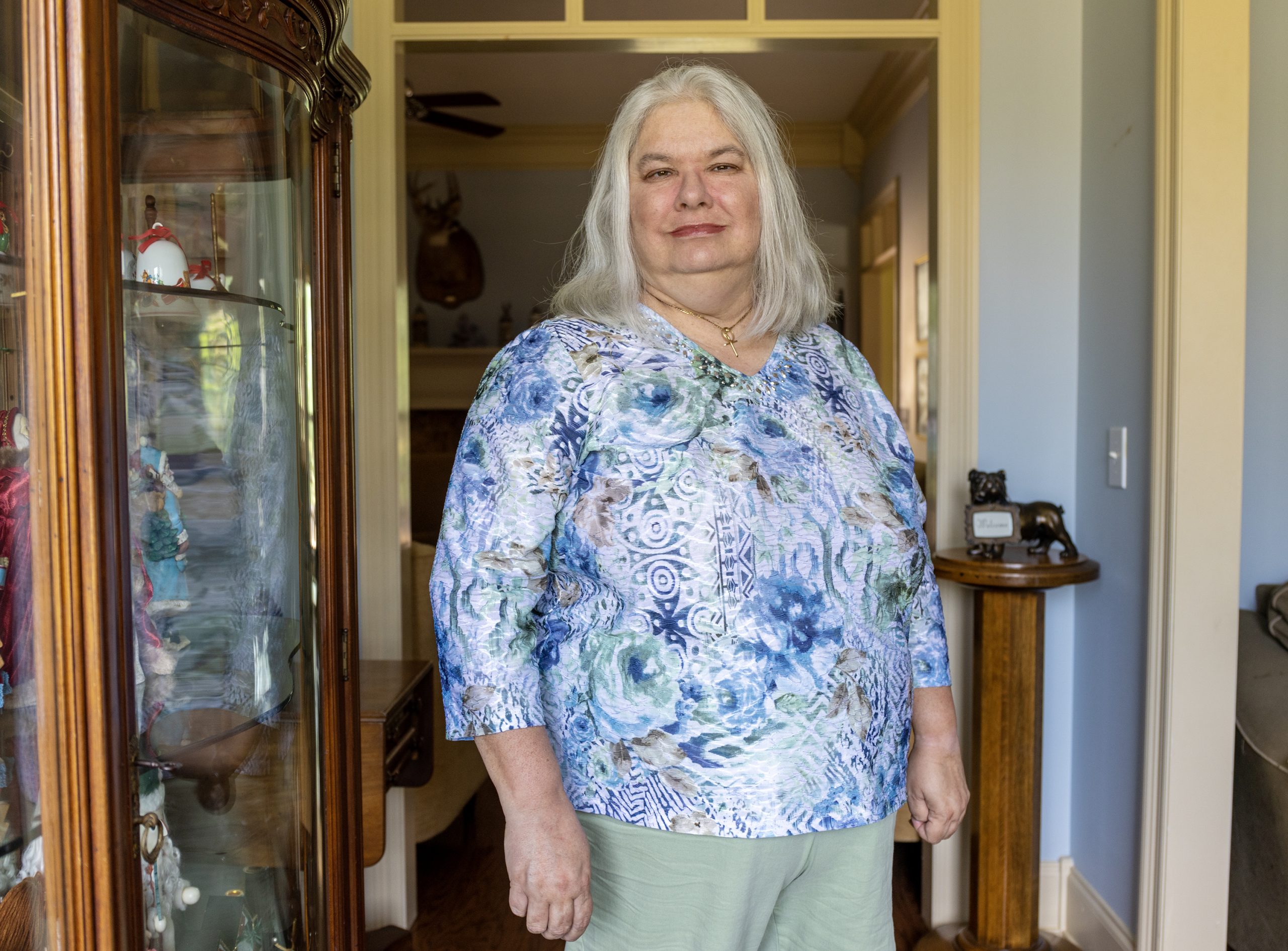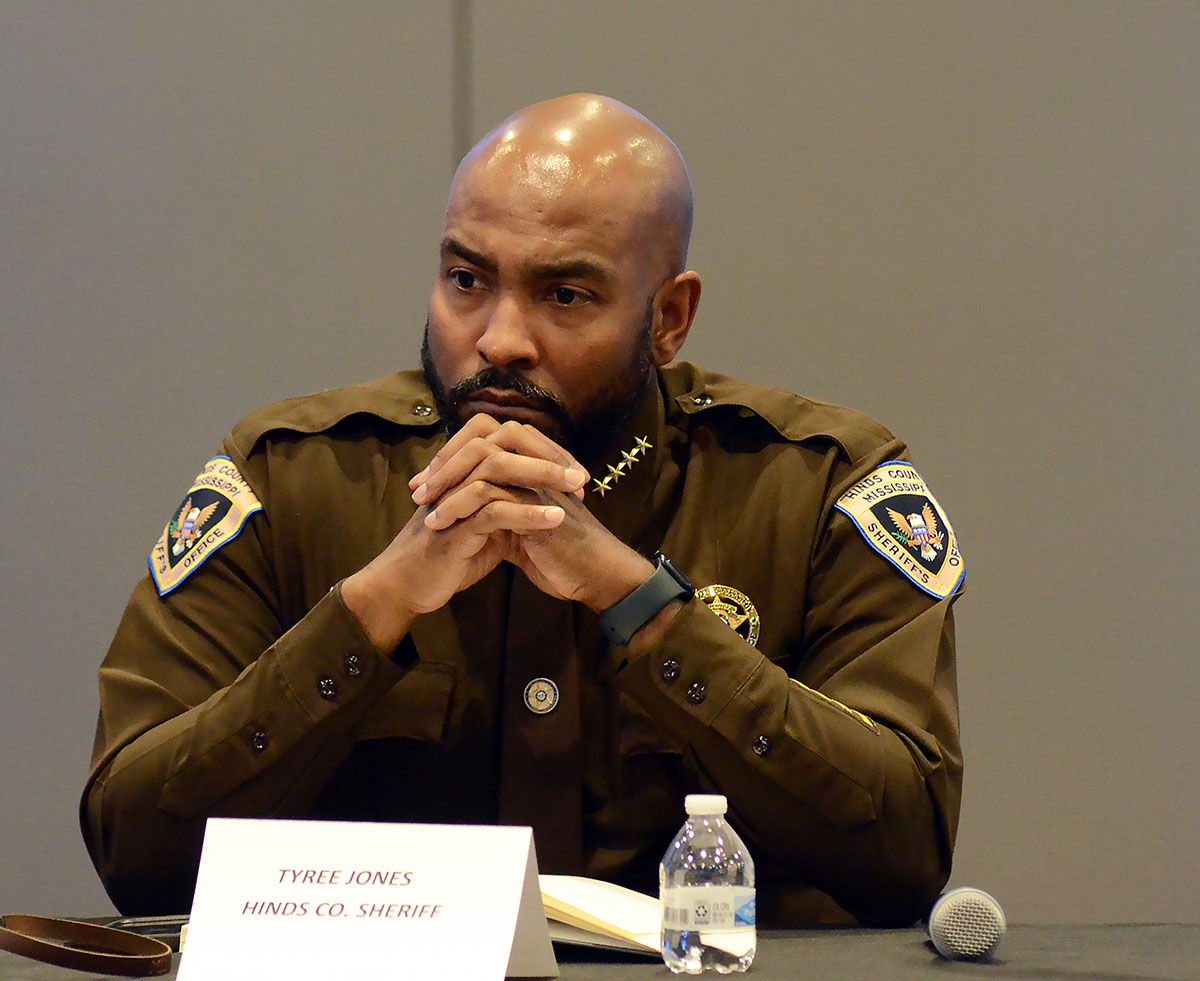Mississippi Today
Patients, advocates worry more people will end up in jail or without treatment following St. Dominic behavioral health closure

Julie Whitehead of Brandon is a longtime patient of St. Dominic’s behavioral health services. After being admitted to the hospital following a suicide attempt in 2006, Whitehead was diagnosed with bipolar disorder.
She was admitted again six times over the next 15 years.
“Each one of those times, if I had not been admitted to St. D, I would be dead,” Whitehead said.
So when she heard the news the 83-bed unit was closing last week, she took it hard.
She has always considered herself lucky – she works part time and has Medicare and private insurance through her husband.
“I have resources. I’m not in the fix that a lot of people are in who suffer from mental illness. I’m not dependent on Medicaid and trying to find doctors who will take Medicaid, so I’m never worried about getting care,” she said.
But when St. Dominic’s announced the closure, her perspective changed.
“I’ve just kind of been in shock because if the beds aren’t there, it doesn’t matter whether I can pay for it or not …” she said.
The unit had been providing inpatient mental health and geriatric psychiatric treatment. But the nonprofit hospital, citing “significant financial challenges” and losses of several million dollars, announced it was discontinuing the services and laying off 5.5% of its total workforce earlier this month.
The hospital’s most recent available tax filing for the fiscal year ending June 2021 showed a loss of $21.7 million for the prior year. That year’s tax filing showed a gain but coincided with hospitals receiving an influx of federal COVID-19 aid.

Advocates and law enforcement worry that as a result of the closure, more people in the Jackson area who need treatment will end up in jails or without the help they need.
Hinds County Sheriff Tyree Jones called the move “disappointing” in a tweet.
“Jails across our state and America are populated with ‘patients’ suffering from mental illnesses. Sheriffs and wardens assume the responsibility of these individuals when in reality, SOME of them should not be in jail but rather a treatment institution,” he wrote. “The risks will increase.”
A spokesperson for St. Dominic said the hospital recognizes mental health is “a significant need.”
“While continuing to meet these needs directly is no longer viable for St. Dominic’s, we are working with partners to help patients access the care they need,” Meredith Bailess said in an emailed statement. “Our health system will continue to advocate for additional state and federal resources to stabilize healthcare providers in Mississippi.”
Although the Mississippi State Hospital opened 20 adult psychiatric beds earlier this year that had been closed due to staffing issues, reliance on the state-funded hospital is no longer a viable option as jailed suspects wait weeks and even months for an available bed for a mental health evaluation. Bed availability at the University of Mississippi Medical Center in Jackson is limited, with only 21 adult beds and 12 beds for children.
Hinds Behavioral Health Services is one of 14 regional community mental health centers in Mississippi. The goal of the centers is to provide services to citizens with mental health issues and, when possible, keep people out of institutions.
The center runs a 24/7 mobile crisis unit that responds to people in crisis and attempts to stabilize them.
However, of the 1,196 people the unit came in contact with over the last year, 643 of those required a higher level of care, or admission to an inpatient facility, according to Jamie Evans, the supervisor for the mobile crisis unit at Hinds Behavioral Health Services.
When that happens, there are two options in the metro area for those people to go and immediately receive care: St. Dominic and Merit Health Central. The other options, which are referred to as a “single point-of-entry,” is the 16-bed crisis stabilization unit in Jackson. Another is the unit in Brookhaven, about an hour drive from Jackson.
Crisis stabilization units are short-term residential treatment facilities run by community health centers where people having a mental health crisis can be stabilized.
Single point-of-entry locations have memorandums of understanding with the community health center, and patients are able to bypass emergency rooms and be immediately admitted for care.
“It’s almost as if even if they are full, they secure beds on the side for us, because we’re meeting an individual in crisis, in one of the most vulnerable points in their mental health,” said Evans, explaining the relationship between Hinds Behavioral Health Services and single points of entry. “It’s very fast paced, and we really don’t have time to sit in the ER and wait for a doctor to see them.”
Now, however, the only single point-of-entry option besides the crisis stabilization unit in Jackson is Merit Health Central, which houses around 70 psychiatric beds, according to Evans.

The services’ closure, which Hinds Behavioral Health Services learned about at the same time the hospital made its public announcement, will leave a substantial gap, Evans and other mental health advocates agreed.
“There will be a huge impact to the systems, especially the elderly and those that find themselves in a crisis situation,” said Angela Ladner, executive director of the Mississippi Psychiatric Association.
She also said the speed at which the closure is happening is “disconcerting.”
In worse-case scenarios, mentally ill people with nowhere to go can end up in jail – unregulated facilities that are detrimental to people going through a mental health crisis.
In an attempt to minimize that practice, the Legislature this year passed House Bill 1222, which required mental health training for law enforcement agencies.
The hospital, which was purchased by the Baton Rouge-based Franciscan Missionaries of Our Lady Health System in 2019, announced the unit was closing on June 5 and would stop accepting patients at 7 a.m. the next day.
In the meantime, Evans and other advocates say they will work together to find a way to bridge the gap. Hinds Behavioral Health Services received funding to open a second, 16-bed crisis stabilization unit in Hinds County, but that won’t happen immediately.
Whitehead says her next steps are to collect a “portable” version of her more-than-a-decade worth of medical records to take with her wherever she lands next.
She guesses the only other thing she can do is “do my best to stay stable.”
Correction 6/14/23: This story has been updated to reflect that there is also a crisis stabilization unit in Jackson.
Editor’s note: Julie Whitehead freelanced for the Mississippi Center for Investigative Reporting, which is now part of Mississippi Today.
This article first appeared on Mississippi Today and is republished here under a Creative Commons license.
Mississippi Today
1964: Mississippi Freedom Democratic Party was formed
April 26, 1964

Civil rights activists started the Mississippi Freedom Democratic Party to challenge the state’s all-white regular delegation to the Democratic National Convention.
The regulars had already adopted this resolution: “We oppose, condemn and deplore the Civil Rights Act of 1964 … We believe in separation of the races in all phases of our society. It is our belief that the separation of the races is necessary for the peace and tranquility of all the people of Mississippi, and the continuing good relationship which has existed over the years.”
In reality, Black Mississippians had been victims of intimidation, harassment and violence for daring to try and vote as well as laws passed to disenfranchise them. As a result, by 1964, only 6% of Black Mississippians were permitted to vote. A year earlier, activists had run a mock election in which thousands of Black Mississippians showed they would vote if given an opportunity.
In August 1964, the Freedom Party decided to challenge the all-white delegation, saying they had been illegally elected in a segregated process and had no intention of supporting President Lyndon B. Johnson in the November election.
The prediction proved true, with white Mississippi Democrats overwhelmingly supporting Republican candidate Barry Goldwater, who opposed the Civil Rights Act. While the activists fell short of replacing the regulars, their courageous stand led to changes in both parties.
This article first appeared on Mississippi Today and is republished here under a Creative Commons Attribution-NoDerivatives 4.0 International License.![]()
Mississippi Today
Mississippi River flooding Vicksburg, expected to crest on Monday
Warren County Emergency Management Director John Elfer said Friday floodwaters from the Mississippi River, which have reached homes in and around Vicksburg, will likely persist until early May. Elfer estimated there areabout 15 to 20 roads underwater in the area.
“We’re about half a foot (on the river gauge) from a major flood,” he said. “But we don’t think it’s going to be like in 2011, so we can kind of manage this.”
The National Weather projects the river to crest at 49.5 feet on Monday, making it the highest peak at the Vicksburg gauge since 2020. Elfer said some residents in north Vicksburg — including at the Ford Subdivision as well as near Chickasaw Road and Hutson Street — are having to take boats to get home, adding that those who live on the unprotected side of the levee are generally prepared for flooding.



“There are a few (inundated homes), but we’ve mitigated a lot of them,” he said. “Some of the structures have been torn down or raised. There are a few people that still live on the wet side of the levee, but they kind of know what to expect. So we’re not too concerned with that.”
The river first reached flood stage in the city — 43 feet — on April 14. State officials closed Highway 465, which connects the Eagle Lake community just north of Vicksburg to Highway 61, last Friday.

Elfer said the areas impacted are mostly residential and he didn’t believe any businesses have been affected, emphasizing that downtown Vicksburg is still safe for visitors. He said Warren County has worked with the U.S. Army Corps of Engineers and the Mississippi Emergency Management Agency to secure pumps and barriers.
“Everybody thus far has been very cooperative,” he said. “We continue to tell people stay out of the flood areas, don’t drive around barricades and don’t drive around road close signs. Not only is it illegal, it’s dangerous.”
NWS projects the river to stay at flood stage in Vicksburg until May 6. The river reached its record crest of 57.1 feet in 2011.




This article first appeared on Mississippi Today and is republished here under a Creative Commons Attribution-NoDerivatives 4.0 International License.![]()
Mississippi Today
With domestic violence law, victims ‘will be a number with a purpose,’ mother says
Joslin Napier. Carlos Collins. Bailey Mae Reed.
They are among Mississippi domestic violence homicide victims whose family members carried their photos as the governor signed a bill that will establish a board to study such deaths and how to prevent them.
Tara Gandy, who lost her daughter Napier in Waynesboro in 2022, said it’s a moment she plans to tell her 5-year-old grandson about when he is old enough. Napier’s presence, in spirit, at the bill signing can be another way for her grandson to feel proud of his mother.
“(The board) will allow for my daughter and those who have already lost their lives to domestic violence … to no longer be just a number,” Gandy said. “They will be a number with a purpose.”
Family members at the April 15 private bill signing included Ashla Hudson, whose son Collins, died last year in Jackson. Grandparents Mary and Charles Reed and brother Colby Kernell attended the event in honor of Bailey Mae Reed, who died in Oxford in 2023.
Joining them were staff and board members from the Mississippi Coalition Against Domestic Violence, the statewide group that supports shelters and advocated for the passage of Senate Bill 2886 to form a Domestic Violence Facility Review Board.
The law will go into effect July 1, and the coalition hopes to partner with elected officials who will make recommendations for members to serve on the board. The coalition wants to see appointees who have frontline experience with domestic violence survivors, said Luis Montgomery, public policy specialist for the coalition.
A spokesperson from Gov. Tate Reeves’ office did not respond to a request for comment Friday.
Establishment of the board would make Mississippi the 45th state to review domestic violence fatalities.
Montgomery has worked on passing a review board bill since December 2023. After an unsuccessful effort in 2024, the coalition worked to build support and educate people about the need for such a board.
In the recent legislative session, there were House and Senate versions of the bill that unanimously passed their respective chambers. Authors of the bills are from both political parties.
The review board is tasked with reviewing a variety of documents to learn about the lead up and circumstances in which people died in domestic violence-related fatalities, near fatalities and suicides – records that can include police records, court documents, medical records and more.
From each review, trends will emerge and that information can be used for the board to make recommendations to lawmakers about how to prevent domestic violence deaths.
“This is coming at a really great time because we can really get proactive,” Montgomery said.
Without a board and data collection, advocates say it is difficult to know how many people have died or been injured in domestic-violence related incidents.
A Mississippi Today analysis found at least 300 people, including victims, abusers and collateral victims, died from domestic violence between 2020 and 2024. That analysis came from reviewing local news stories, the Gun Violence Archive, the National Gun Violence Memorial, law enforcement reports and court documents.
Some recent cases the board could review are the deaths of Collins, Napier and Reed.
In court records, prosecutors wrote that Napier, 24, faced increased violence after ending a relationship with Chance Fabian Jones. She took action, including purchasing a firearm and filing for a protective order against Jones.
Jones’s trial is set for May 12 in Wayne County. His indictment for capital murder came on the first anniversary of her death, according to court records.
Collins, 25, worked as a nurse and was from Yazoo City. His ex-boyfriend Marcus Johnson has been indicted for capital murder and shooting into Collins’ apartment. Family members say Collins had filed several restraining orders against Johnson.
Johnson was denied bond and remains in jail. His trial is scheduled for July 28 in Hinds County.
He was a Jackson police officer for eight months in 2013. Johnson was separated from the department pending disciplinary action leading up to immediate termination, but he resigned before he was fired, Jackson police confirmed to local media.
Reed, 21, was born and raised in Michigan and moved to Water Valley to live with her grandparents and help care for her cousin, according to her obituary.
Kylan Jacques Phillips was charged with first degree murder for beating Reed, according to court records. In February, the court ordered him to undergo a mental evaluation to determine if he is competent to stand trial, according to court documents.
At the bill signing, Gandy said it was bittersweet and an honor to meet the families of other domestic violence homicide victims.
“We were there knowing we are not alone, we can travel this road together and hopefully find ways to prevent and bring more awareness about domestic violence,” she said.
This article first appeared on Mississippi Today and is republished here under a Creative Commons Attribution-NoDerivatives 4.0 International License.
-

 News from the South - Florida News Feed6 days ago
News from the South - Florida News Feed6 days agoJim talks with Rep. Robert Andrade about his investigation into the Hope Florida Foundation
-

 News from the South - Alabama News Feed5 days ago
News from the South - Alabama News Feed5 days agoPrayer Vigil Held for Ronald Dumas Jr., Family Continues to Pray for His Return | April 21, 2025 | N
-

 Mississippi Today5 days ago
Mississippi Today5 days ago‘Trainwreck on the horizon’: The costly pains of Mississippi’s small water and sewer systems
-

 News from the South - Florida News Feed4 days ago
News from the South - Florida News Feed4 days agoTrump touts manufacturing while undercutting state efforts to help factories
-

 News from the South - Texas News Feed5 days ago
News from the South - Texas News Feed5 days agoMeteorologist Chita Craft is tracking a Severe Thunderstorm Warning that's in effect now
-

 News from the South - Florida News Feed4 days ago
News from the South - Florida News Feed4 days agoFederal report due on Lumbee Tribe of North Carolina’s path to recognition as a tribal nation
-

 News from the South - Arkansas News Feed6 days ago
News from the South - Arkansas News Feed6 days agoAs country grows more polarized, America needs unity, the ‘Oklahoma Standard,’ Bill Clinton says
-

 News from the South - Virginia News Feed5 days ago
News from the South - Virginia News Feed5 days agoTaking video of military bases using drones could be outlawed | Virginia














































